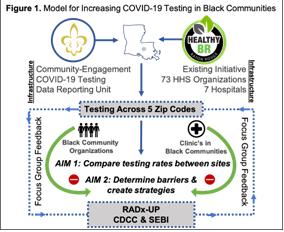Pennington Biomedical, HealthyBR part of nationwide effort to fill gaps in care

Credit: Pennington Biomedical Research Center
Pennington Biomedical Research Center is leading a federally funded effort to increase COVID-19 testing in Louisiana’s Black communities, which have been hit hard by the virus.
“African Americans make up one-third of the state’s population, but they account for nearly half of Louisiana’s COVID-related deaths. Efforts to implement testing in underserved Black communities have met with limited success so far,” said Pennington Biomedical Executive Director John Kirwan, Ph.D. “This project will help us find community-driven approaches to reduce the barriers to testing and the best strategies to increase testing in underserved Black communities.”
Pennington Biomedical Research Center and the Louisiana Clinical & Translational Science Center (LA CaTS), a partnership of the state’s leading research institutions, will head the project. The HealthyBR initiative, a collaboration among Baton Rouge’s 73 top health and human services organizations and hospital systems, is also a partner.
“After decades of community-based research, Pennington Biomedical is well-positioned to identify COVID-19 testing needs and challenges in Black neighborhoods,” said Associate Executive Director of Population and Public Health Sciences Peter Katzmarzyk, Ph.D. “For example, Pennington Biomedical helped low-income patients with obesity lose weight by putting health coaches into primary care clinics, a setting where the patients were more comfortable.
“We think more people will participate in COVID-19 testing if Louisiana makes the tests available in more relaxed settings, such as churches, schools, and community centers.”
Dr. Kirwan said Pennington Biomedical’s work with HealthyBR and its members’ strong community presence and connections will also help achieve the project’s aims.
The project will be funded by $1.8 million under a program overseen by the National Institutes of Health. A part of the Rapid Acceleration of Diagnostics (RADx) initiative, the RADx Underserved Populations (RADx-UP) program will support research that aims to better understand COVID-19 testing patterns among underserved and vulnerable populations; strengthen the data on disparities in infection rates, disease progression and outcomes; and develop strategies to reduce the disparities in COVID-19 testing.
Pennington Biomedical is one of 55 institutions that received an NIH award through the RADx-UP program to support projects designed to rapidly implement COVID-19 testing strategies in populations disproportionately affected by the pandemic. These groups include African Americans, American Indians/Alaskan Natives, Latinos/Latinas, Native Hawaiians, older adults, pregnant women and those who are homeless or incarcerated.
Louisiana’s Congressional delegation backed Pennington Biomedical’s efforts to secure the research funding. Sen. Bill Cassidy and Rep. Garret Graves wrote letters of support to the NIH for the initial grant application.
This research is supported by the National Institute of General Medical Sciences of the National Institutes of Health under award number 3U54GM104940-05S3. The content is solely the responsibility of the authors and does not necessarily represent the official views of the National Institutes of Health.
###
About the Pennington Biomedical Research Center
The Pennington Biomedical Research Center is at the forefront of medical discovery as it relates to understanding the triggers of obesity, diabetes, cardiovascular disease, cancer and dementia. The Center conducts basic, clinical, and population research, and is affiliated with Louisiana State University. The research enterprise at Pennington Biomedical includes over 450 employees within a network of 40 clinics and research laboratories, and 13 highly specialized core service facilities. Its scientists and physician/scientists are supported by research trainees, lab technicians, nurses, dietitians, and other support personnel. Pennington Biomedical is located in state-of-the-art research facilities on a 222-acre campus in Baton Rouge, Louisiana. For more information, see http://www.
Pennington Biomedical Research Center
6400 Perkins Road
Baton Rouge, LA 70808
Media Contact
Ted Griggs
[email protected]
Original Source
https:/




